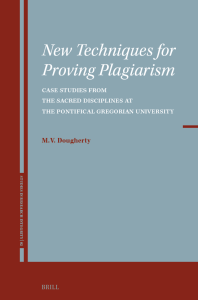Retraction Watch readers may recall the work of Michael Dougherty, who has established a reputation as a sleuth focused on plagiarism. We are pleased to present an excerpt of Dougherty’s new book, New Techniques for Proving Plagiarism: Case Studies from the Sacred Disciplines at the Pontifical Gregorian University, Studies in Research Integrity, vol. 2 (Leiden: Brill 2024).
The principles of textual criticism—borrowed from the fields of classics and medieval studies—have a valuable application for plagiarism investigations. Plagiarists share key features with medieval scribes who worked in scriptoriums and produced copies of manuscripts. Both kinds of copyists—scribes and plagiarists—engage in similar processes, and they commit certain distinctive copying errors that fall into identifiable classes. When committed by plagiarists, these copying errors have probative value for making determinations that a text is copied, and hence, unoriginal.
To demonstrate fully that a text is a plagiarism of another text, one must show how the text is plagiarizing the other text. Many plagiarism researchers, as well as members of institutional research integrity committees, miss this step. They take the mere identification of textual overlap to be the upper limit of analysis. By stopping short, they leave themselves vulnerable to the typical defenses made—sometimes in bad faith—by academic malefactors and their apologists. Those defenses can include: a claim of independent fortuitous discovery; a claim that one was simply recalling a lecture from memory; a claim that one had cryptomnesia from reading many sources; and the like.
Continue reading A look at plagiarism at the Pontifical Gregorian University







